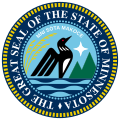Background
In 1976, U.S. Senator Walter Mondale was elected Vice President of the United States as the running mate of Georgia governor Jimmy Carter and resigned from his current term, which was set to expire in 1979. To fill the vacancy created by Mondale's resignation, Governor Wendell Anderson resigned from office himself and was succeeded by Lieutenant Governor Rudy Perpich, who appointed Anderson to complete the remainder of Mondale's term in office.
In January 1978, Minnesota's other Senator, former Vice President Hubert H. Humphrey, died in office. Rudy Perpich appointed his widow, Muriel Humphrey, to complete his turn in office. Thus, the incumbent Governor and both Senators were all members of the Democratic-Farmer-Labor Party, and none had been elected to their current office. (Republicans took advantage of this, putting up billboards that read, "The DFL is going to face something scary — an election".)
This page is based on this
Wikipedia article Text is available under the
CC BY-SA 4.0 license; additional terms may apply.
Images, videos and audio are available under their respective licenses.



